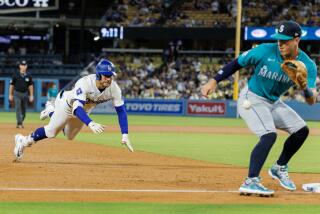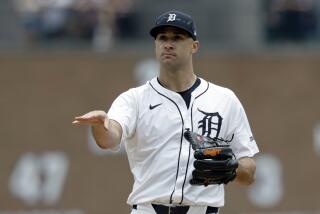18 Months Later, These Are Not Beltre’s Dodgers
- Share via
This isn’t much of a homecoming game. Adrian Beltre would love to catch up with all the friends he left behind, but most of them are gone too. The place he left behind is different too, with the seats decorated in pastels and luxury boxes encroaching upon the territory in which the third baseman used to catch foul balls.
Beltre and the Dodgers divorced 18 months ago, after a passionate summer of home runs, after the joy of a division championship, after the nightly three-letter serenades at Dodger Stadium: “M-V-P! M-V-P!”
The Dodgers didn’t win a playoff series. Beltre didn’t win the most-valuable-player award. Paul DePodesta tore up the roster. Beltre fled for Seattle. The Dodgers lost 91 games. Ned Colletti replaced DePodesta as general manager and tore up the roster again.
So, as he returns to Dodger Stadium tonight with the Mariners, Beltre might look into the home dugout and wonder, “Who the heck are you guys?”
At the same time, tens of thousands of fans might look at Beltre and wonder, “What the heck happened to you?”
He left town as a homegrown superstar. He returns as a big-bucks bust. And, in a reflective moment before a recent game, he wondered aloud whether he would have suffered through the struggles of the last two seasons had he stayed with the Dodgers.
“Probably not,” he said. “Probably not. You never know. It’s baseball. But probably not.... It was going to be the team that I had always been with, and I was going to play in a league that I had played in for the last seven years. So probably not.”
Beltre delivered five decent seasons for the Dodgers, then one historic one, in 2004. He hit .334 with 48 home runs, most in the major leagues and tied with Mike Schmidt for the record by a third baseman. He drove in 121 runs. Barry Bonds was the MVP, but Beltre was second.
The Dodgers had pledged all summer to treat Beltre as their top priority, but they belatedly entered the bidding, at six years and $60 million. The Mariners already had offered five years and $64 million, and the Detroit Tigers reportedly dangled seven years at $90 million.
Agent Scott Boras said Beltre never asked him to work out the best deal so he could stay in Los Angeles.
“Adrian makes those decisions,” Boras said. “He knew the options. He could have made more money in another place. He felt Seattle as a destination would work for him.”
So far, it hasn’t. He hit .255 with 19 home runs last season, with a career-high 108 strikeouts. He is hitting .238 this season, with six home runs, on pace for another career high in strikeouts.
One by one, Beltre dismissed a handful of alleged explanations for his diminished performance.
Safeco Field? The Mariners’ ballpark is terrific, if you’re a pitcher.
“Dodger Stadium was not the best ballpark to hit in,” he said, “but I used to love to hit in Dodger Stadium.”
A sound ankle? Beltre played the 2004 season with two bone spurs in his left ankle, and some observers argue the injury restricted his swing and forced him to drive the ball to the opposite field.
“People say that, but it’s not true,” he said. “It never bothered me to hit. It bothered me after I would swing and miss, or to run. To hit? No.”
Steroids, or human growth hormone? His statistical profile -- one outstanding year, out of line with the rest of his career -- tends to raise suspicion these days.
In an otherwise calm conversation, his voice rose.
“Never in my life,” he said. “Never will. Never have. Anybody who knows me knows I would never even think about that. Plus, I’ve had the same type of body....
“People can say whatever they want. I don’t mind. I know in my heart that I’m clean.”
The Mariners’ theory is this: Beltre tried to legitimize his salary with every at-bat, pulling pitches and swinging for home runs in a ballpark that kills right-handed power hitters. After scouts identified that tendency, opposing pitchers fed him breaking balls away, messing up his swing and his confidence.
“To me, his biggest problem is that he cares so much, and he wants to do so well and justify everything, that he just doesn’t allow himself to relax,” Manager Mike Hargrove said. “As soon as we can get that into his head and he can accept it, I think he’s going to be all right.”
Hargrove dropped him as low as seventh in the lineup. Three weeks ago, he moved him to second, in the hope he would shorten his swing and concentrate on contact rather than power. In 18 games since then, Beltre is batting .278, with four home runs and 13 runs batted in.
“He’s headed in the right direction,” General Manager Bill Bavasi said. “He’s not where he needs to be. But where he needs to be, simply put, is making hard contact. Everything else will come from that.”
Said Beltre: “I’m probably not going to hit 40 home runs again, but I can do a lot better than I’m doing right now. I know I’m capable of hitting 30 homers and 100 RBIs again. Whether I do it or not, I believe I can do it. I hope I can get comfortable and be the player I was before.”
Bavasi insisted the Mariners never expected him to duplicate his magical finale with the Dodgers. He said he envisioned Beltre performing somewhere between his 2004 numbers and the average of his pre-2004 numbers.
In the five full seasons preceding 2004, Beltre hit .265 with an average of 18 homers and 73 RBIs. If the Mariners truly expected Beltre to hit .280 with 25 to 30 homers and 80 to 100 RBIs each season, why did they pay him $13 million a year?
“The money is a function of the market,” Bavasi said. “If you pay based on what you expect, would Vladdy be getting what he’s getting, or would he be getting what A-Rod is getting?”
Vladimir Guerrero also makes $13 million a year, and Alex Rodriguez makes $25 million a year.
“The year the guy is a free agent, what’s the market?” Bavasi said, “I’m not trying to insult anybody, but to look at it any other way is foolish. It’s what the market is bearing. Baseball is not immune to supply and demand.”
So Beltre will bat second tonight, with Jose Lopez batting third. Lopez is 22, in his first full season. Beltre is 27.
“Adrian is very hard on himself when he doesn’t perform at the level he expects,” Boras said. “The great players, as they figure those things out, work through those difficulties in their 20s, and that makes them great players in their 30s.”
Beltre will be 30 when his contract expires. He still owns a home in Arcadia. Maybe he will make his way back to the Dodgers.
“I would never say no, especially because I live here,” Beltre said. “We’ll see what happens. Who knows? I might retire.”
More to Read
Are you a true-blue fan?
Get our Dodgers Dugout newsletter for insights, news and much more.
You may occasionally receive promotional content from the Los Angeles Times.








